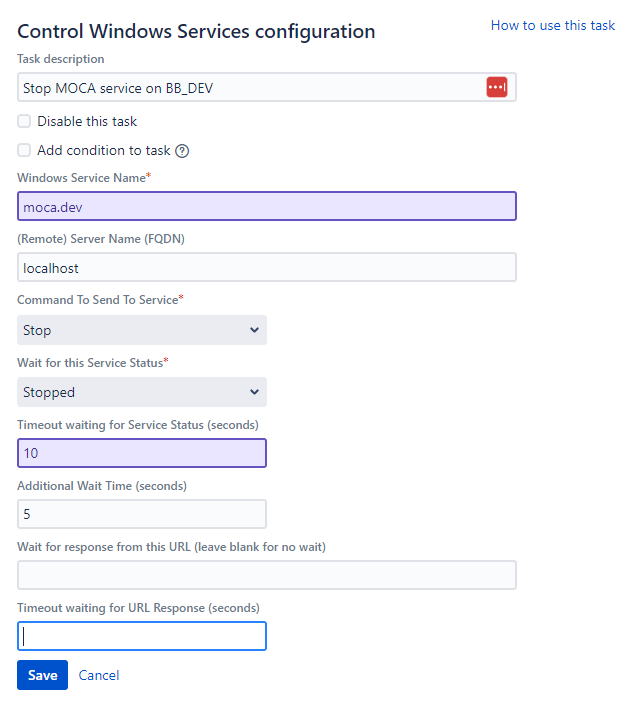Control Windows Service Task
Control Windows Service Task
Description
The Control Windows Service task is made to stop and start windows services. Specifically taylored to environments. It has features to start and stop environments remotely, assuming the Bamboo Windows user has permission to execute these functions on the remote server. The remote feature allows for a process to stop all related environments at once, then install all rollouts and start up the environments in the right sequence. Settings to wait for an environment to be back up before continuing ensures that environments are really stopped or started before taking the next step.
Task Type
This task can be used in both build plans and deployment projects.

Task Screen

| Field | Description | Sample Data |
|---|---|---|
| Description | Description for this task. | Stop MOCA service on BB-DEV |
| Disable this task | To temporarily disable the task | |
| Windows Service Name | Windows Service name as it shows up in 'Service Name' when viewing the Properties of a windows service. | moca.dev |
| (Remote) Server Name (FQDN) | The Fully Qualified Domain Name of the windows server where the service runs. This can be a different server as where the Bamboo Agent runs on. For remote commands to work, the user that runs the Bamboo Agent should have permission to stop this remote service. | localhost |
| Command To Send To Service | One of the following options:
| Stop |
| Wait for this Service Status | One of the following options:
| Stopped |
| Timeout waiting for Service Status (seconds) | Time to wait for the expected Service Status before the task fails. In seconds. No timeout if blank (windows system timeout is used) | 20 |
| Additional Wait Time (seconds) | How long to wait after the expected Service Status. Blank for no extra wait time. | 20 |
| Wait for response from this URL | If we want to make sure the the moca service is back up, we can enter the URL for the moca service to make sure it is actually started. The task will repeatedly try to reach the URL and it will wait for a HTTP 200 response. Leave blank if we don't want to wait for a URL | |
| Timeout waiting for URL Response (seconds) | How long should the task rettry and wait for the URL to respond with a 200 status in seconds | 30 |
